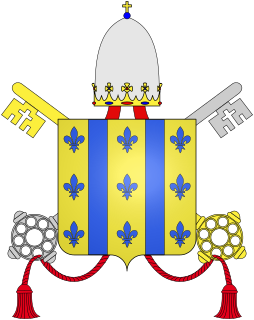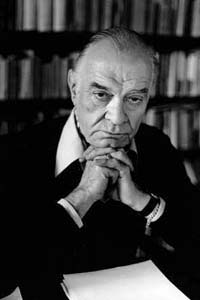Related Research Articles

Pope Innocent V, born Pierre de Tarentaise, was head of the Catholic Church and ruler of the Papal States from 21 January to 22 June 1276. A member of the Order of Preachers, he acquired a reputation as an effective preacher. He held one of the two "Dominican Chairs" at the university of Paris, and was instrumental in helping with drawing up the "program of studies" for the Order. In 1269, Peter of Tarentaise was Provincial of the French Province of Dominicans. He was a close collaborator of Pope Gregory X, who named him Bishop of Ostia and raised him to cardinal in 1273.

Groupe Union Défense, better known as GUD, was a French far-right students' union.

Étienne Henri Gilson was a French philosopher and historian of philosophy. A scholar of medieval philosophy, he originally specialised in the thought of Descartes, yet also philosophized in the tradition of Thomas Aquinas, although he did not consider himself a Neo-Thomist philosopher. In 1946 he attained the distinction of being elected an "Immortal" (member) of the Académie française. He was nominated for the Nobel Prize in Literature.

Nicolas Coeffeteau was a French theologian, poet and historian born at Saint-Calais.

Noël Alexandre, or Natalis Alexander in Latin was a French theologian, author, and ecclesiastical historian.

Denys Louis de Rougemont, known as Denis de Rougemont, was a Swiss writer and cultural theorist who wrote in French. One of the non-conformists of the 1930s, he addressed the perils of totalitarianism from a Christian point of view. After the Second World War, he promoted European federalism.

Peter Paludanus (c.1275–1342) was a French theologian and archbishop.

Jean-Antoine de Mesmes, comte d'Avaux (1661–1723) was a premier president of the Parlement of Paris and member of the Académie française. As premier president he presided at the rescinding of the will of Louis XIV and in 1720 at the remonstrance against the regent, Philippe of Orléans, for allowing Law's disastrous financial scheme and appointing Guillaume Dubois as archbishop of Cambrai.

Fleury François Richard, sometimes called Fleury-Richard, was a painter of the École de Lyon. A student of Jacques-Louis David, Fleury-Richard and his friend Pierre Révoil were precursors of the Troubador style.

Maurice Chappaz was a French-language Swiss poet and writer. He published more than 40 books and won several literary awards, including his country's most notable award, the Grand Prix Schiller, in 1997.

Jean-Jacques de Mesmes, comte d'Avaux, vicomte de Neufchâtel (1630–1688) was a French magistrate, intendant of Soissons, and Président à mortier of the Parlement of Paris. He developed the town of Avaux-la-Ville, which is now called Asfeld. He was a member of the Académie française. He was brother of Jean-Antoine de Mesmes, the diplomat, and father of Jean-Antoine de Mesmes, the premier president of the Parlement of Paris.

Servais-Théodore Pinckaers O.P. was a noted moral theologian, Roman Catholic priest, and member of the Dominican Order. He has been especially influential in the renewal of a theological and Christological approach to Christian virtue ethics.
Charles-Joseph Mathon de la Cour was a French art critic, mathematician, financier, and essayist.
Jean-François Cars, was a French engraver, printer, publisher and printseller from Lyon.
Émile Lombard (1875-1963) was a French-Swiss biblical scholar.

Jean-Baptiste François Rozier was a French botanist and agronomist.

Benoît Lacroix was a Quebec theologian, philosopher, Dominican priest, professor in medieval studies and historian of the Medieval period, and author of almost 50 works and a great number of articles.
André Gaudreault is a Canadian film historian and theorist who holds the Canada Research Chair in Film and Media Studies.

François Bœspflug is a French historian of Christianity and Christian art, in particular of the Middle Ages. He specialises in the iconography of the Bible moralisée.
Thomas Christian Römer is a German-born Swiss biblical scholar, exegete, philologist, professor, and Reformed minister. After teaching at the University of Geneva, he became professor of the Old Testament at the University of Lausanne and, from 2007, has held the chair "Biblical environments" at the Collège de France, of which he became administrator in 2019.
References
- ↑ Mosheim, Johann Lorenz (1871). Institutes of Ecclesiastical History. Vol. 2. Translated by James Murdock. R. Carter & Bros. p. 401.
- ↑ Vollert, Cyril O. (1947). Doctrine of Hervaeus Natalis. Gregorian Biblical BookShop. pp. 112–113. ISBN 9788876520242.
- M. Reymond, «Jacques de Vuadens dit de Lausanne, dominicain, provincial de France au XIVe s.», in Annales Fribourgeoises, 2, 1914, 226-231.
- Th. Kaeppeli, Scriptores Ordinis Praedicatorum Medii Aevi, 2, 1975, 323-329.
- M.-P. Manello, "Per una edizione critica del Sermonario di Giacomo di Lausanne: il sermone 'Mitto angelum meum'", in Salesianum, 39, 1977, 389-429.
- B. Andenmatten, "Les Studia des ordres mendiants à Lausanne (XIIIe - XVIe s.)", in Ecoles et vie intellectuelle à Lausanne au Moyen Age, edited by A. Paravicini Bagliani, 1987, 81-82.
- M. Morard, «Les testaments des frères : le cas de Jacques de Lausanne, o. p. (†1321)», dans : Les ordres mendiants et l’économie, dir. Nicole BÉRIOU et Jacques CHIFFOLEAU, LYON, Presses universitaires de Lyon, 2009, p. 387-425 [édition et analyse du testament de Jacques de Lausanne]